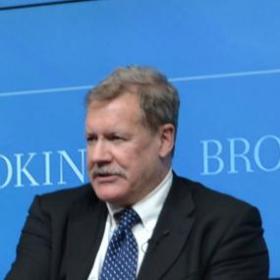
Mitigating Economic Shock
Writing for New Europe, EWI Professorial Fellow Greg Austin discusses the need for a system to anticipate and mitigate global economic shocks.
The international crisis management apparatus emerging after the Global Financial Crisis (GFC) is focused too narrowly on the financial sector. The apparatus is assessed as weak and as unrepresentative of key actors, both by sector and by geographic region. East Asian economic power is seriously under-represented.
There has been little effort since the GFC to bridge decision-makers and communities of interest currently separated either by the private/public divide or by political differences involving countries such as the United States, China, Russia, India, and EU members.
“Economic shock” is an event that can cause a sudden, drastic change in an economy. It can originate from outside or within the economic sphere. The causes can come from government policy settings, political change, natural causes, technological change, irrational market behavior or war and terrorist attacks.
The international community has invested heavily in the past twenty years in preventing large scale violent conflict because of the human and economic costs. Yet the human and developmental costs of global economic shock, though less visibly deadly, may be higher in many ways than those caused by war. The international community has not developed a systematic approach to dealing with the heavy human costs of global economic shock, nor does it have the institutions to do so.
Most countries pay little attention to the sum total of effects of economic shock beyond their own borders. When a global economic shock occurs, there are low levels of trust between major actors and they typically resort to “financial nationalism”.
The inadequacy of current global institutions is widely recognized. A 2009 OECD study concluded that since the GFC “has struck at a time of great global interdependence”, the response to these “unprecedented events” cannot be “business as usual”. It suggested that new institutional mechanisms are needed to generate truly global, integrated and multidimensional responses. A 2010 OECD study assessed the impact on fragile states of several successive economic shocks: “Fragile states are suffering from the cumulative effects of three consecutive and inter-related shocks – the food price crisis, escalating oil prices, and the global financial crisis – proving that their economies are more integrated into the world economy than previously thought.”
The 2010 Economic Report of the U.S. President noted that regulatory responses to global crises are not adapting well because they limit themselves to national settings and this narrow approach creates incentives for behavior that saps confidence. “Financial stress can spread quickly and easily across borders”, it said, “Yet regulation is still set largely in a national context and has failed to effectively adapt”.
A more comprehensive OECD study on “Future Global Shocks” conducted over two years and published in 2011 reviewed shocks arising from five different sources: financial crises, cyber risks, pandemics, geomagnetic storms and social unrest. It recommended that international co-ordination to address global shocks should be strengthened at all phases of the risk management cycle. It also called for self-organisation needs to be promoted across society as a cornerstone of building resilience. It suggested that efforts to improve resilience should focus on routine processes, e.g. information-sharing, broad consultation and participation, training exercises and simulations, citizen level resilience.
An April 2012 op-ed from the Peterson Institute’s Edwin M. Truman assessed that “the G-20’s accomplishments [in response to the GFC] are in danger of unraveling, because these countries have failed to implement their agreements on reform of the International Monetary Fund.”
In a June 2012 paper, David Korowicz went so far as to contemplate the proposition that a return to normal from a global shock may not be possible and it is time to begin to plan “how we might move forward if a reversion to current conditions proves impossible”. He outlines how contagion in the financial system could set off semi-autonomous contagion in supply chains globally. He notes that “Our immediate concern is crisis and shock planning. It should now be clear that this is far more extensive than merely focusing on the financial system”.
A July 2012 report from the office of the UN Secretary General, Ban Ki Moon, gives a comprehensive review of the success in reforms of the global financial system, including its ability to handle systemic shock. Having noted that at the international level, reforms have concentrated on the Basel III arrangements, the report assessed that “changes envisaged in the Basel III framework might be too small to sufficiently enhance resilience” and that we needed “more attention to linkages between the financial sector and the real economy”.
An IMF internal document (3 October 2012) reporting the findings of an early warning exercise conducted by the Financial Stability Board, concluded that there are important risks to the implementation of reforms, and that this is reflected in the lack of market confidence. It also concluded that there are signs of fragmentation in the financial system. It called for immediate efforts to rebuild confidence and for financial sector reform.
At a broader level, the problem of weak institutions in the face of global threats has been neatly summarized in a unique official assessment by the United States National Intelligence Council and the European Union’s official Security Studies Institute. They jointly concluded in October 2010 that the “growing number of issues on the international agenda, and their complexity, is outpacing the ability of international organizations and national governments to cope”.
A system for anticipating and mitigating economic shock should be an important part of improved global governance. The EastWest Institute is working with partners from business and government to devise such a system. It will need to include new confidence building measures, new arrangements for trusted information sharing, and more politicized communications channels on the subject of economic shock.

